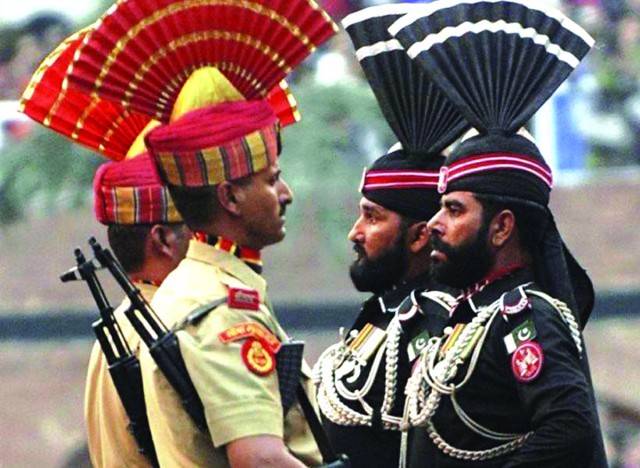
Recent reports suggest that a conscious effort is afoot both in Pakistan and in India to lower the temperature and de-escalate tensions in the region. First came the news last month of renewal of a ceasefire along the Line of Control in Kashmir. Then came statements by both Prime Minister Imran Khan and Army Chief General Bajwa calling for better relations between the two countries. Experts of the two countries resumed talks on sharing Indus waters after a long time. Prime Minister Modi sent a get well message when Imran Khan was diagnosed with coronavirus. On Pakistan Day on March 23, he sent a letter felicitating the people of Pakistan and desiring cordial relations.
At the security dialogue in Islamabad last week, while Imran Khan referred to Kashmir as the lone irritant between the two countries, the army chief talked only of “burying the past and moving on.” In a country where unfortunately the foreign and security policies are largely written in the sealed corridors of GHQ rather than in the open in the Parliament or the Foreign Office, the nuances in the words of the army chief are weighed carefully. The prime minister also refrained from using harsh words about PM Modi that he used in the past. Until recently he rejected talks with India until it reversed the August 2019 annexation of Kashmir. Now he only wanted India to take the first step without dictating what that step was.
The Heart of Asia conference on Afghanistan is scheduled to be held in Tajikistan’s capital Dushanbe later this month. Another high-level contact is expected when the foreign ministers of both countries attend the conference. Reportedly, the two countries have agreed, under the aegis of SAARC, to cooperate on healthcare and there are indications that talks on religious pilgrimages will also be resumed.
Given the hostilities along the LoC, the upping of the ante after India removed the special status of Kashmir and the unsavory exchanges in the wake of Balakot and Pulwama incidents, these are noteworthy events indicating a nascent peace process. However, such developments have happened several times in the past. But just when the two countries appeared to take meaningful steps, spoilers on both sides struck to derail the process.
In February 1999, Prime Minister Vajpai undertook a bus journey to Lahore in a major move to normalize ties. Within months, he was paid back with the Kargil misadventure. Pakistan claimed that the attack was launched by the mujahedeen but there were not many takers of this claim.

In November 2008, soon after he became the president, Asif Ali Zardari offered talks to India on ‘No First Use’ of atomic weapons. Within days, the Mumbai attack was launched by militants killing 166 people. Pakistani investigators found that the militants received training in Tattha in Sindh and the attack was launched from Pakistan. Twelve years on, the trial of Mumbai accused has still not concluded.
On Christmas Day in 2015, Narendra Modi made a surprise visit to Pakistan to meet Nawaz Sharif in Raiwind Lahore, the first such visit in over a decade.
The two PMs had already agreed that their foreign secretaries would meet in mid-January, and their national security advisers (NSAs) a month later.
A few days after Modi’s visit, on January 2, India’s Pathankot airbase was attacked by gunmen. Although there is no evidence, Indian officials have blamed Pakistan-based Jaish-e-Mohammed (JeM) for the Pathankot attack. A day after Pathankot, India’s consulate in Mazar-e-Sharif in northern Afghanistan was besieged by militants for over 24 hours.
There are strong reasons to fear that the current nascent peace process will also meet the same fate.
If we have to “bury the past and move forward” it must begin by the realization of the need to think out of the box. This calls for an admission that conventional and sub-conventional wars by Pakistan over Kashmir have not produced the desired result. Brandishing nuclear weapons has also not helped. Former PAF chief Air Marshal Asghar Khan has publicly stated that all wars with India were started by Pakistan and that none achieved the desired purpose.
To bury the past also requires revisiting some of the narratives. One such narrative is about the plebiscite under UN resolutions. A most important condition of the UN mandated plebiscite is that Pakistan must first pull out all armed citizens and groups from the area it had occupied while India is allowed to retain security machinery for peace during the plebiscite exercise. Have we given a thought to it and are ready for it?
There is also the narrative of fear that has been fed to the people. According to this narrative, Hindu India has not accepted the reality of Pakistan and that it is waiting for an opportunity to conquer and annex Pakistan anytime. Only foolish Hindus in India will want to annex Pakistan and risk being outnumbered by Muslims in just a few decades. Why not question these narratives publicly?
To “bury the past” and to take a fresh start in the peace process we need to bury the past narratives.
The writer is a former senator
At the security dialogue in Islamabad last week, while Imran Khan referred to Kashmir as the lone irritant between the two countries, the army chief talked only of “burying the past and moving on.” In a country where unfortunately the foreign and security policies are largely written in the sealed corridors of GHQ rather than in the open in the Parliament or the Foreign Office, the nuances in the words of the army chief are weighed carefully. The prime minister also refrained from using harsh words about PM Modi that he used in the past. Until recently he rejected talks with India until it reversed the August 2019 annexation of Kashmir. Now he only wanted India to take the first step without dictating what that step was.
The Heart of Asia conference on Afghanistan is scheduled to be held in Tajikistan’s capital Dushanbe later this month. Another high-level contact is expected when the foreign ministers of both countries attend the conference. Reportedly, the two countries have agreed, under the aegis of SAARC, to cooperate on healthcare and there are indications that talks on religious pilgrimages will also be resumed.
Given the hostilities along the LoC, the upping of the ante after India removed the special status of Kashmir and the unsavory exchanges in the wake of Balakot and Pulwama incidents, these are noteworthy events indicating a nascent peace process. However, such developments have happened several times in the past. But just when the two countries appeared to take meaningful steps, spoilers on both sides struck to derail the process.
In February 1999, Prime Minister Vajpai undertook a bus journey to Lahore in a major move to normalize ties. Within months, he was paid back with the Kargil misadventure. Pakistan claimed that the attack was launched by the mujahedeen but there were not many takers of this claim.

In November 2008, soon after he became the president, Asif Ali Zardari offered talks to India on ‘No First Use’ of atomic weapons. Within days, the Mumbai attack was launched by militants killing 166 people. Pakistani investigators found that the militants received training in Tattha in Sindh and the attack was launched from Pakistan. Twelve years on, the trial of Mumbai accused has still not concluded.
On Christmas Day in 2015, Narendra Modi made a surprise visit to Pakistan to meet Nawaz Sharif in Raiwind Lahore, the first such visit in over a decade.
The two PMs had already agreed that their foreign secretaries would meet in mid-January, and their national security advisers (NSAs) a month later.
A few days after Modi’s visit, on January 2, India’s Pathankot airbase was attacked by gunmen. Although there is no evidence, Indian officials have blamed Pakistan-based Jaish-e-Mohammed (JeM) for the Pathankot attack. A day after Pathankot, India’s consulate in Mazar-e-Sharif in northern Afghanistan was besieged by militants for over 24 hours.
There are strong reasons to fear that the current nascent peace process will also meet the same fate.
If we have to “bury the past and move forward” it must begin by the realization of the need to think out of the box. This calls for an admission that conventional and sub-conventional wars by Pakistan over Kashmir have not produced the desired result. Brandishing nuclear weapons has also not helped. Former PAF chief Air Marshal Asghar Khan has publicly stated that all wars with India were started by Pakistan and that none achieved the desired purpose.
To bury the past also requires revisiting some of the narratives. One such narrative is about the plebiscite under UN resolutions. A most important condition of the UN mandated plebiscite is that Pakistan must first pull out all armed citizens and groups from the area it had occupied while India is allowed to retain security machinery for peace during the plebiscite exercise. Have we given a thought to it and are ready for it?
There is also the narrative of fear that has been fed to the people. According to this narrative, Hindu India has not accepted the reality of Pakistan and that it is waiting for an opportunity to conquer and annex Pakistan anytime. Only foolish Hindus in India will want to annex Pakistan and risk being outnumbered by Muslims in just a few decades. Why not question these narratives publicly?
To “bury the past” and to take a fresh start in the peace process we need to bury the past narratives.
The writer is a former senator

